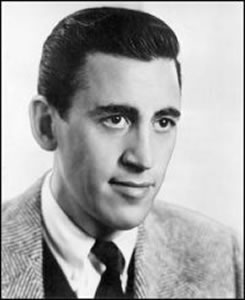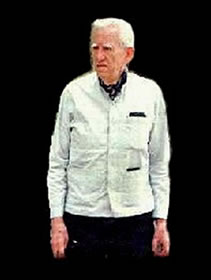De Engelse romanschrijver en essayist Edward Morgan Forster werd geboren op 1 januari 1879. Zie ook mijn blog van 1 januari 2007.
Uit: A Passage to India
“EXCEPT for the Marabar Caves — and they are twenty miles off — the city of Chandrapore presents nothing extraordinary. Edged rather than washed by the river Ganges, it trails for a couple of miles along the bank, scarcely distinguishable from the rubbish it deposits so freely. There are no bathing-steps on the river front, as the Ganges happens not to be holy here; indeed there is no river front, and bazaars shut out the wide and shifting panorama of the stream. The streets are mean, the temples ineffective, and though a few fine houses exist they are hidden away in gardens or down alleys whose filth deters all but the invited guest. Chandrapore was never large or beautiful, but two hundred years ago it lay on the road between Upper India, then imperial, and the sea, and the fine houses date from that period. The zest for decoration stopped in the eighteenth century, nor was it ever democratic. There is no painting and scarcely any carving in the bazaars. The very wood seems made of mud, the inhabitants of mud moving. So abased, so monotonous is everything that meets the eye, that when the Ganges comes down it might be expected to wash the excrescence back into the soil. Houses do fall, people are drowned and left rotting, but the general outline of the town persists, swelling here, shrinking there, like some low but indestructible form of life.
Inland, the prospect alters. There is an oval Maidan, and a long sallow hospital. Houses belonging to Eurasians stand on the high ground by the railway station. Beyond the railway — which runs parallel to the river — the land sinks, then rises again rather steeply. On the second rise is laid out the little civil station, and viewed hence Chandrapore appears to be a totally different place. It is a city of gardens. It is no city, but a forest sparsely scattered with huts. It is a tropical pleasaunce washed by a noble river. The toddy palms and neem trees and mangoes and pepul that were hidden behind the bazaars now become visible and in their turn hide the bazaars. They rise from the gardens where ancient tanks nourish them, they burst out of stifling purlieus and unconsidered temples. Seeking light and air, and endowed with more strength than man or his works, they soar above the lower deposit to greet one another with branches and beckoning leaves, and to build a city for the birds. Especially after the rains do they screen what passes below, but at all times, even when scorched or leafless, they glorify the city to the English people who inhabit the rise, so that new-comers cannot believe it to be as meagre as it is described, and have to be driven down to acquire disillusionment. As for the civil station itself, it provokes no emotion. It charms not; neither does it repel. It is sensibly planned, with a red-brick club on its brow, and farther back a grocer’s and a cemetery, and the bungalows are disposed along roads that intersect at right angles. It has nothing hideous in it, and only the view is beautiful; it shares nothing with the city except the overarching sky.”

Edward Morgan Forster (1 januari 1879 – 7 juni 1970)
De Amerikaanse schrijver Jerome David Salinger werd in New York geboren op 1 januari 1919. Zie ook mijn blog van 1 januari 2007.
Uit: The Catcher in the Rye
“’All right,’ I said. But the trouble was, I couldn’t concentrate. About all I could think of were those two nuns that went around collecting dough in those beat-up old straw baskets. Especially the one with the glasses with those iron rims. And this boy I knew at Elkton Hills. There was this one boy at Elkton Hills, named James Castle, that wouldn’t take back something he said about this very conceited boy, Phil Stabile. James Castle called him a very conceited guy, and one of Stabile’s lousy friends went and squealed on him to Stabile. So Stabile, with about six other dirty bastards, went down to James Castle’s room and went in and locked the goddam door and tried to make him take back what he said, but he wouldn’t do it. So they started in on him. I won’t even tell you what they did to him – it’s too repulsive – but he still wouldn’t take it back, old James Castle. And you shoul
d’ve seen him. He was a skinny little weak-looking guy, with wrists about as big as pencils. Finally, what he did, instead of taking back what he said, he jumped out the window. I was in the shower and all, and even I could hear him land outside. But I just thought something fell out the window, a radio or a desk or something, not a boy or anything. Then I heard everybody running through the corridor and down the stairs, so I put on my bathrobe and I ran downstairs, too, and there was old James Castle laying right on the stone steps and all. He was dead, and his teeth, and blood, were all over the place, and nobody would even go near him. He had on this turtleneck sweater I’d lent him. All they did with the guys that were in the room with him was expel them. They didn’t even go to gaol.
That was about all I could think of, though. Those two nuns I saw at breakfast and this boy James Castle I knew at Elkton Hills. The funny part is, I hardly even know James Castle, if you want to know the truth. He was one of these very quiet guys. He was in my Maths class, but he was way over on the other side of the room, and he hardly ever got up to recite or go to the blackboard or anything. Some guys in school hardly ever get up to recite or go to the blackboard. I think the only time I ever even had a conversation with him was that time he asked me if he could borrow this turtleneck sweater I had. I damn near dropped dead when he asked me, I was so surprised and all. I remember I was brushing my teeth, in the can, when he asked me. He said his cousin was coming up to take him for a drive and all. I didn’t even know he knew I had a turtleneck sweater. All I knew about him was that his name was always right ahead of me at roll call. Cabel, R., Cabel, W., Castle, Caulfield – I can still remember it. If you want to know the truth, I almost didn’t lend him my sweater. Just because I didn’t know him too well.”

J.D. Salinger (New York, 1 januari 1919)
De Duitse schrijver en musicus Sven Regener werd geboren op 1 januari 1961 in Bremen. Na het gymnasium studeerde hij muziekwetenschappen in Hamburg en Berlijn. Deze studie brak hij later af. Sinds 1971 speelt hij klassieke gitaar, sinds 1976 trompet, sinds 1985 piano en elektrische gitaar. In 1982 nam hij met de band Zapotek een eerste album op. Hij 1984 kwam hij bij een andere band, Neue Liebe. In 1985 richtte hij de Berlijnse band Element of Crime op, waarvoor hij sindsdien zowat alle songteksten schrijft. In 2001 publiceerde hij zijn eerste roman Herr Lehmann, waarin hij het leven van de barkeeper in Berlijn-Kreuzberg beschrijft. In 2004 verscheen zijn tweede roman Neue Vahr Süd, een soort prolog op Herr Lehmann.
Uit: Herr Lehmann
Der Nachthimmel, der ganz frei von Wolken war, wies in der Ferne, über Ostberlin, schon einen hellen Schimmer auf, als Frank Lehmann, den sie neuerdings nur noch Herr Lehmann nannten, weil sich herumgesprochen hatte, daß er bald dreißig Jahre alt werden würde, quer über den Lausitzer Platz nach Hause ging. Er war müde und abgestumpft, er kam von der Arbeit im Einfall, einer Kneipe in der Wiener Straße, und es war spät geworden. Das war kein guter Abend, dachte Herr Lehmann, als er von der westlichen Seite her den Lausitzer Platz betrat, mit Erwin zu arbeiten macht keinen Spaß, dachte er, Erwin ist ein Idiot, alle Kneipenbesitzer sind Idioten, dachte Herr Lehmann, als er an der großen, den ganzen Platz beherrschenden Kirche vorbeikam. Ich hätte die Schnäpse nicht trinken sollen, dachte Herr Lehmann, Erwin hin, Erwin her, ich hätte sie nicht trinken sollen, dachte er, als sich sein Blick zerstreut in den Maschen der hohen Umzäunung des Bolzplatzes verfing. Er ging nicht schnell, die Beine waren ihm schwer von der Arbeit und vom Alkohol. Das mit dem Schnaps war Quatsch, dachte Herr Lehmann, Tequila und Fernet, morgen früh wird es mir schlecht gehen, dachte er, Arbeiten und Schnapstrinken verträgt sich nicht, alles, was über Bier hinausgeht, ist falsch, dachte er, und gerade ein Typ wie Erwin sollte seine Angestellten nicht noch zum Schnapstrinken überreden, dachte Herr Lehmann. Er kommt sich noch großzügig dabei vor, wenn er die Leute zum Schnapstrinken überredet, dachte Herr Lehmann, dabei tut er das bloß, um selbst einen Vorwand zum Saufen zu haben, aber andererseits, dachte er, ist es auch nicht richtig, die Verantwortung auf Erwin abzuwälzen, am Ende ist man immer selber schuld, wenn man Schnaps trinkt.”

Sven Regener (Bremen, 1 januari 1961)
Zie voor onderstaande schrijvers ook mijn blog van 1 januari 2007.
De Pruisische-Litouwse dichter Kristijonas Donelaitis werd geboren op 1 januari 1714 in Lasdinehlen bij Gumbinnen in het oostelijk deel van Oost-Pruisen.
De Nederlandse dichter, filosoof en advocaat Johannes Kinker werd geboren in Nieuwer-Amstel op 1 januari 1764.







